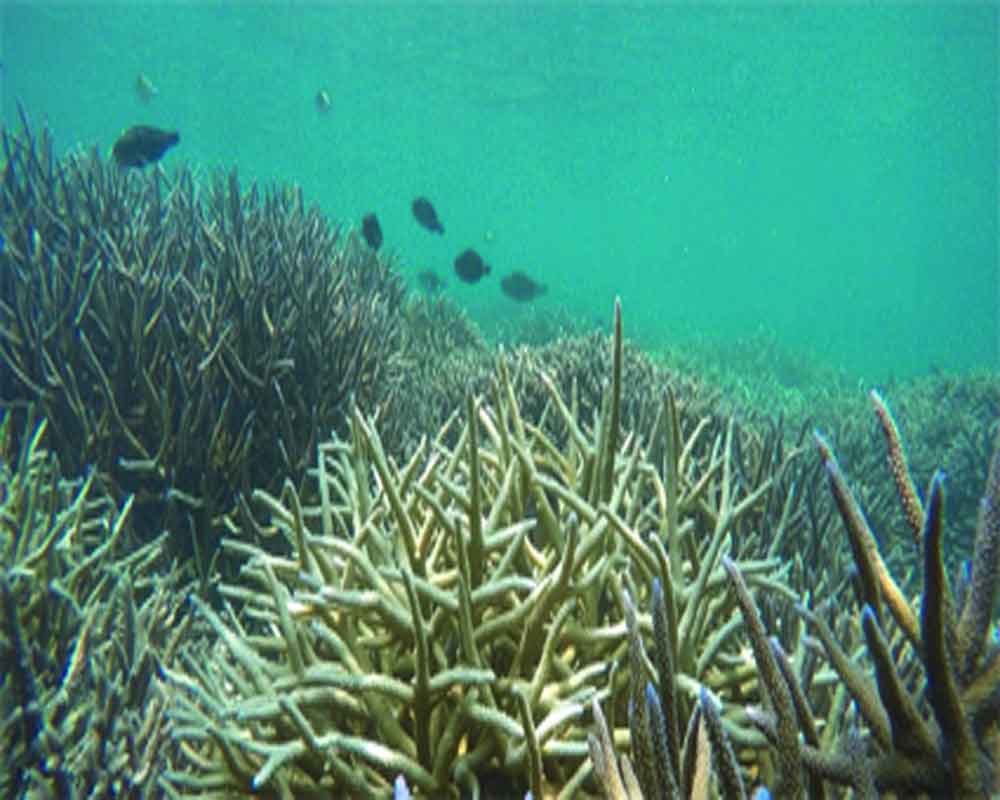The vibrant corals of the picturesque Lakshadweep sea nestled in India’s smallest union territory off the coast of Kerala are losing their sheen as it is experiencing prolonged marine heatwaves since late October 2023.
These marine heat waves, characterised by extended periods of abnormally high ocean temperatures, have pushed the Degree Heating Week (DHW) indicator above 4 °C-weeks, posing a severe threat to coral health, said scientists at the ICAR-Central Marine Fisheries Research Institute (CMFRI) as they observed alarming levels of coral bleaching, indicating significant stress on marine ecosystems in the region.
Coral bleaching occurs when the water temperature becomes excessively warm, causing corals to expel the microscopic algae residing within their tissues. Experts say bleached corals are not dead but are at risk of starvation and disease.
“Such heat stress levels signify a severe threat to coral health, leading to extensive bleaching where corals lose the symbiotic algae (zooxanthellae), compromising their survival by depriving them of essential nutrients. If the DHW continues to rise, reaching beyond 12 °C weeks, it could precipitate an unprecedented biodiversity crisis due to multispecies mortality,” KR Sreenath, senior scientist at CMFRI, said on Monday.
According to the National Oceanic and Atmospheric Administration (NOAA), this level of DHW poses a substantial risk of coral bleaching, threatening the region’s diverse marine ecosystems.
Corals are living organisms that make up the reefs and provide the ecosystem for marine life to thrive, especially fish. Coral reefs are a natural barrier, protecting these islands against the swelling of the seas, and keeping salt water out of the limited freshwater sources in the region.
Shelton Padua, another senior scientist, identified the primary causes of these marine heat waves as excessive heat atmospheric transfer coupled with shifts in ocean currents, leading to unusually high water temperatures.
He explained that since October 27, 2023, the Lakshadweep Sea, spanning from 80.0 to 12.0 N latitude and 71.0 to 75.0 E longitude, has been experiencing these conditions, with temperatures consistently registering rises greater than 1°C above the norm.
Viewing that the health of marine ecosystems is integral to the livelihoods of coastal communities, influencing tourism and fisheries sectors, Sreenath said the ongoing marine heat waves are likely to cause significant economic losses for the inhabitants who are mostly dependent on the earnings from the sea whether it is a fish or allied community or the tourists sector.
The heatwaves also threaten other critical marine habitats, including sea-grass meadows. Similar to corals, sea-grass meadows are experiencing detrimental impacts due to the heat waves such as impaired photosynthesis, reduced growth, and hindered reproductive functions.
Lakshadweep came into the limelight earlier this year with Prime Minister Narendra Modi’s visit. Lakshadweep’s island’s sea vibrant corals have always been a huge draw to the tourists.
“The degradation of these ecosystems can lead to the collapse of local marine food webs, affecting a wide range of marine species, from fish communities to marine mammals like dugongs and dolphins,” Sreenath warned. The waters of the archipelago, though, are spread over 400,000 square kilometres and are rich in marine life and resources. But the CMFRI observation has come as an alarm to the authorities.
Furthermore, the heat waves also endanger critical marine habitats like sea-grass meadows, impairing photosynthesis, growth, and reproductive functions. The degradation of these ecosystems can disrupt local marine food webs, impacting a wide range of species, from fish communities to marine mammals like dugongs and dolphins.
To address these challenges, CMFRI is actively researching ecological changes affecting coral reefs and has initiated a national project to investigate coral reef resilience. By integrating advanced climatic modeling, deep-learning, and ecological research, the institute aims to develop resilience-based management strategies to ensure the long-term sustainability of coral reef ecosystems.


























